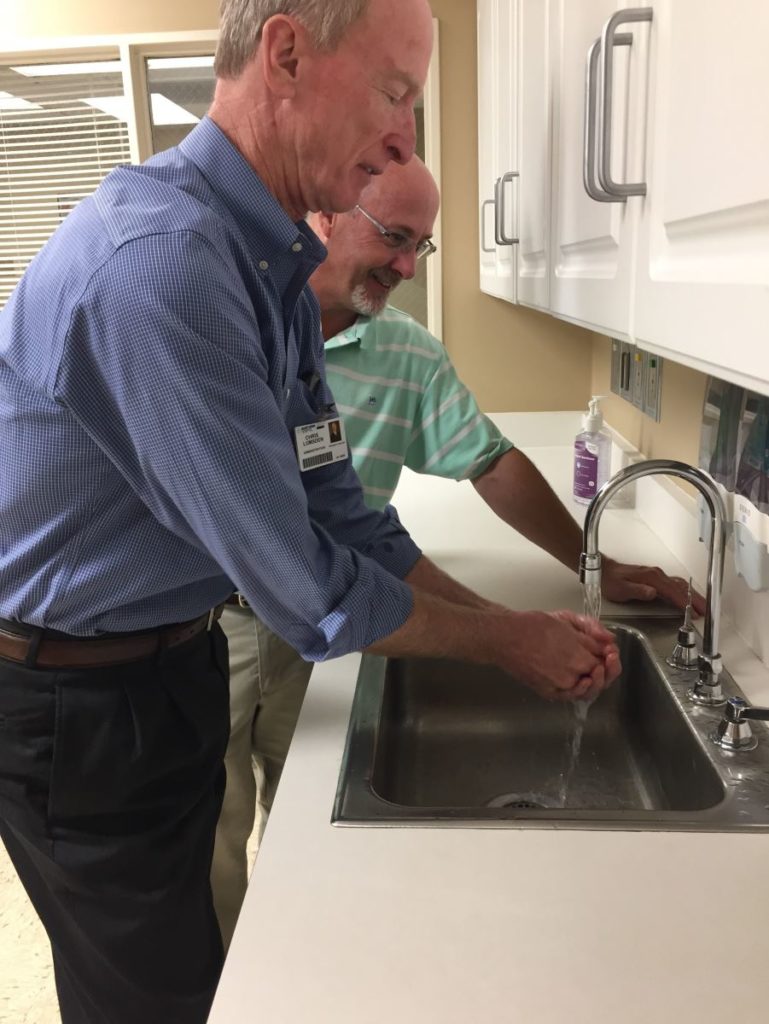Do you wash your hands after using the bathroom? Well according to a recent CDC (Centers for Disease Control and Prevention), only 31% of men and 65% of women washed their hands after using a public restroom.
On Monday, October 15th Northern Hospital will recognize Global Handwashing Day and Northern wants to stress to the public the importance of good hand hygiene. Global Handwashing Day is a global advocacy day dedicated to increasing awareness and understanding about the importance of handwashing with soap as an effective and affordable way to prevent diseases. According to the CDC, handwashing with soap removes germs from hands and helps prevent sickness. Their studies have shown handwashing can prevent 1 in 3 diarrhea-related sicknesses and 1 in 5 respiratory infections, such as a cold or the flu.
- People often touch their eyes, nose, and mouth, introducing germs into their bodies.
- Germs from unwashed hands may get into foods and drinks when people prepare or consume them. Germs can grow in some types of foods or drinks and make people sick.
- Germs from unwashed hands can be transferred to other objects such as doors knobs, tables, or toys, and then transferred to another person’s hands.
Did you know there is a right way to wash your hands?
- Wet your hands with clean running water (warm or cold) and apply soap.
- Lather your hands by rubbing them together with the soap.
- Scrub all surfaces of your hands, including the palms, backs, fingers, between your fingers, and under your nails. Keep scrubbing for at least 20 seconds. Need a timer? Hum the “Happy Birthday” song twice.
- Rinse your hands under clean, running water.
- Dry your hands using a clean towel or air dry them.
- In public settings, use the towel to open the bathroom door when exiting. If towels are not available, use your arm if possible to keep from touching the handle or knob.
Handwashing at any time of the day can help ride germs, but there are key times when it’s most important to wash your hands.
- Before, during, and after preparing food
- Before eating food
- Before and after caring for someone who is sick
- Before and after treating a cut or wound
- After using the bathroom, changing diapers, or cleaning up a child who has used the bathroom
- After blowing your nose, coughing, or sneezing
- After touching an animal, animal foods or treats, animal cages, or animal feces (poop)
- After touching garbage
- If your hands are visibly dirty or greasy.
What type of soap should you use?
You can use bar soap or liquid soap to wash your hands. Many public places provide liquid soap because it’s easier and cleaner to share with others. Studies have not found any added health benefit from using soaps
containing antibacterial ingredients when compared with plain soap. Both are equally effective in getting rid of terms. If soap and water are not available, use an alcohol-based hand sanitizer that contains at least 60% alcohol.
On Monday, Northern Hospital will kick off a new training initiative for it’s non-clinical staff to increase hand hygiene habits. Clinical staff are trained on a regular basis on hand hygiene but those in non-clinical areas typically do not. The initiative will begin with literature in these areas and training sessions will take place over the next several weeks.

Primary Source:
Centers for Disease Control and Prevention
Starting at the top, Brian Moser, Manager, Environmental Services at Northern who is leading the hand hygiene initiative, instructs Hospital CEO Chris Lumsden in the proper steps to hand washing.
